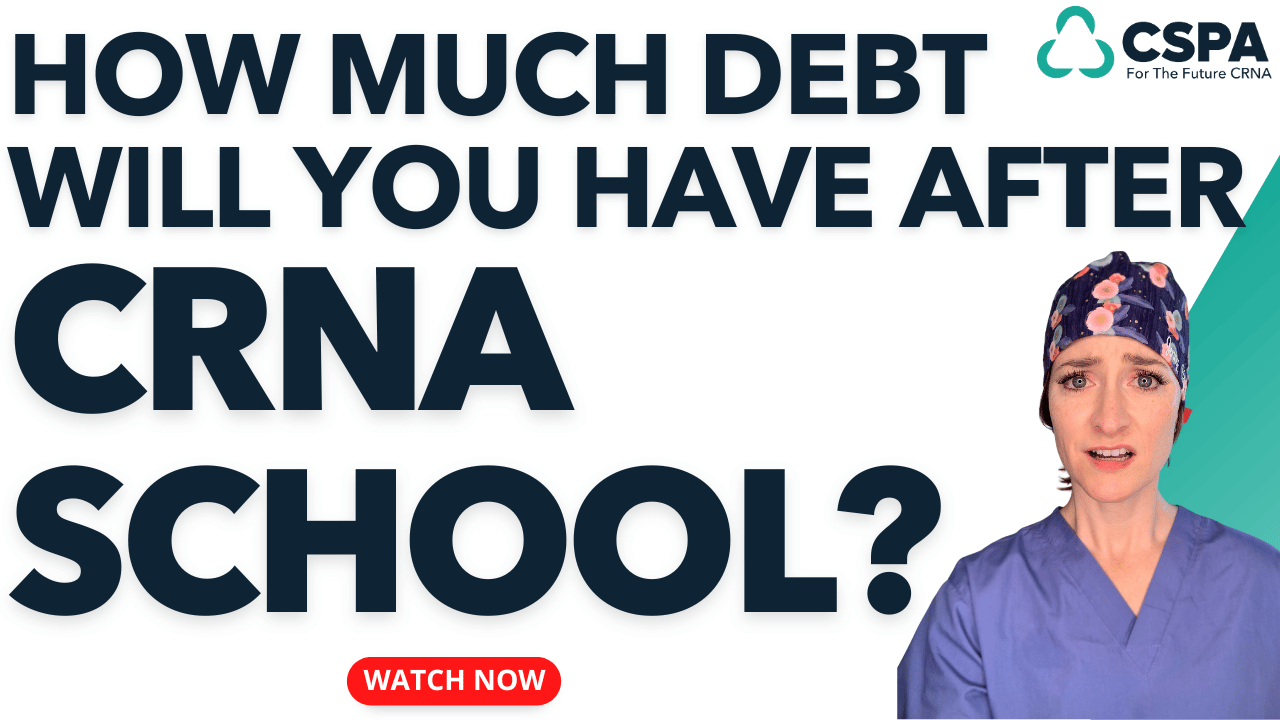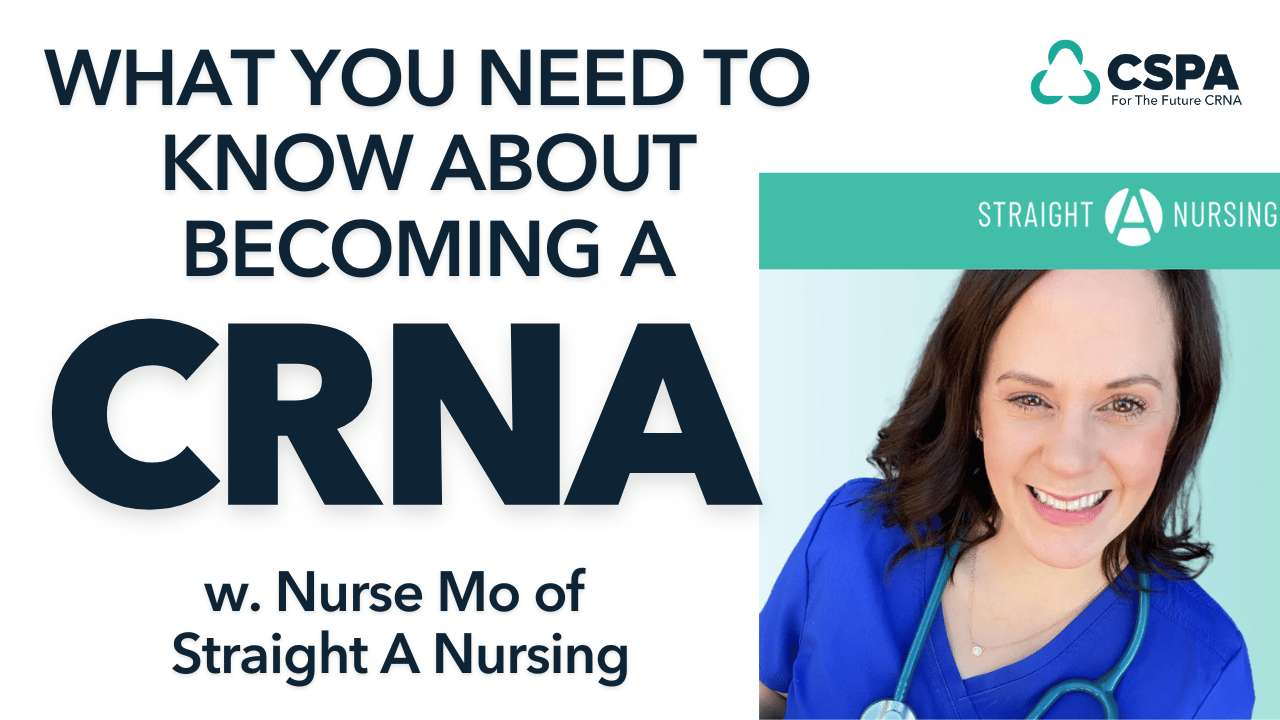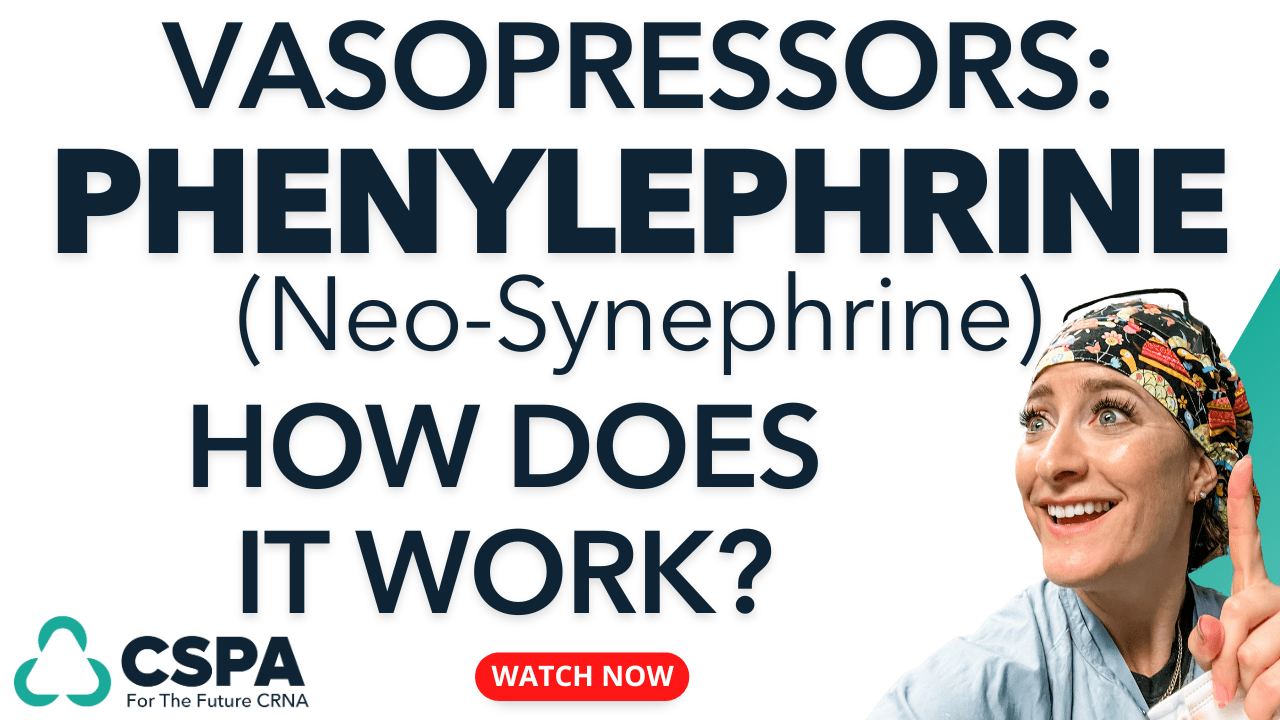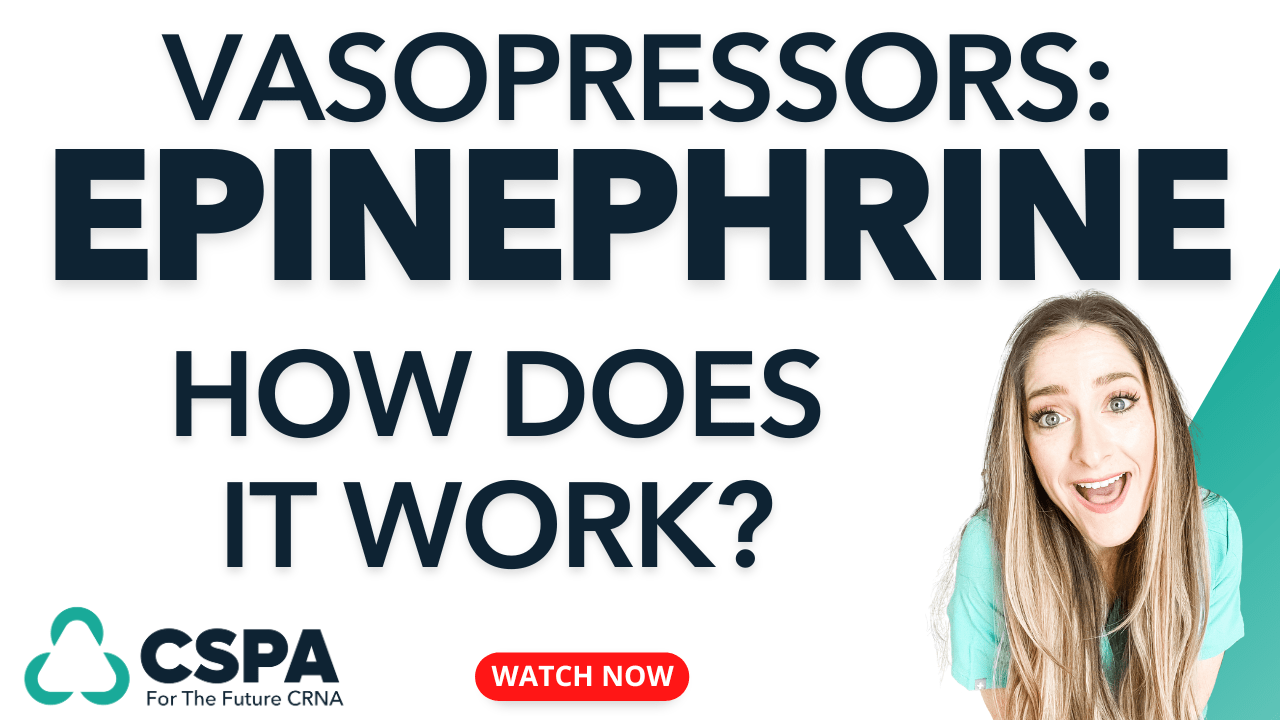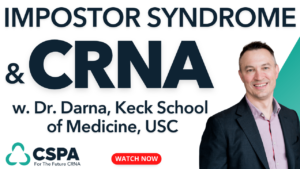
Get Your Free 8 Steps to CRNA Road Map Guide
You can only get yourself as far in your CRNA journey as you allow yourself. Unfortunately, some of us are held back from what we now know as the Impostor Syndrome. It’s time we tackle this often overlooked topic and instill more confidence in aspiring CRNAs.
Dr. Jeff Darna, CRNA, DNP, and Co-Program Director at Keck School of Medicine of USC joins Dr. Richard Wilson for Episode 7 of the Nurse Anesthesia Educators Unplugged Podcast, a podcast exclusively for CRNA School Prep Academy students.
Here’s a sneak peek of their discussion as they tackle the topic of Impostor Syndrome, including insights into how it impacts the Healthcare field, including aspiring CRNAs and Nurse Anesthesia Residents, and how to overcome it.
Listen to the full episode inside CRNA School Prep Academy today!
Join CRNA School Prep Academy for Complete Access to This Episode and the Entire Nurse Anesthesia Educators: Unplugged Library PLUS ALL of the Planning & Application Tools, Interview Prep Tools and More That Have Helped Thousands Of Nurses Gain Acceptance Into CRNA School: https://www.crnaschoolprepacademy.com/join
Join the CSPA email list: https://www.cspaedu.com/podcast-email
Join the Free Facebook Community here! https://www.facebook.com/groups/crnaschoolprepacademyfree
Book a mock interview, resume or personal statement critique, transcript review and more: www.teachrn.com
—
Watch the episode here
Listen to the podcast here
Impostor Syndrome With Dr. Jeff Darna, CRNA, DNP And Co-Program Director At Keck School Of Medicine Of USC
I have some exciting news to share with you. We have released the Nurse Anesthesia Educators Unplugged, which is going to be your gateway to success. I want you to discover the inside scoop. I want you to be able to navigate the complexities of CRNA admissions and thrive as a candidate and a nurse anesthesia resident, which can seem like a daunting task, but what if you had a trusted guide at your fingertips? This is why we’re excited to introduce the Nurse Anesthesia Educators Unplugged, which is CSPA’s private podcast, your one-stop auditory guide to achieving your CRNA dreams.
Here are the key benefits and features of this private podcast. We will hear directly from the experts, listen to seasoned CRNA faculty members who know the admissions process inside and out, and get invaluable insights, not from the brochures or websites. You’re going to hear from behind the scenes and discover the lesser-known details of the selection process, the traits that faculty look for in candidates, and the hidden pitfalls to avoid.
Knowing that all schools are a little unique, this is going to give you that invaluable insight that’s going to allow you to see the differences between different CRNA programs and the faculty that run these programs. You’re going to hear real stories, hear from successful students who have been in your shoes, and learn about their challenges, strategies, and what made them stand out. You’re going to get strategic advice. Beyond grades, how can you learn to craft a compelling application such as for your essay or your interview responses that will resonate with the admissions teams?
You’re also going to get flexible learning. You can listen to this podcast on your commute, during your workouts, or even while cooking. We want this learning to fit your schedule. You’re going to hear a lot of Q&As on these podcasts. These questions and answers are found in our private CSPA community. We pick questions that are commonly asked by CSPA students and bring them to the table during this faculty podcast. It’s a great way to hear commonly asked questions from a variety of faculty and different insights on that.
We also want you to stay up-to-date. The admissions landscape is always changing. We want to make sure that you’re updated on the latest trends, requirements, and strategies for success. Last but not least, we want to help you build confidence. Knowing what to expect and how to prepare can dramatically increase your confidence, giving you the edge during the application interview process.
I hope this sounds exciting to you. I hope you’re as pumped as I am to tune into these shows. Remember, if you’re a CSPA student, you’re going to have access to this private podcast, but don’t worry. We want to make sure we’re not excluding anyone from this podcast. On occasion, we are going to share sneak peeks with our regular CSPA audiences because I want everyone to succeed.
Whether you’re a CSPA member for twelve months or a short period, you’re going to have access to the entire library of private CSPA faculty podcasts. This is a valuable resource that we are excited to bring to you. I want to lead you to the conclusion that whether or not you’re contemplating a CRNA career or you’re already deep in the application process, the Nurse Anesthesia Educators Unplugged is your secret weapon to equip yourself with the knowledge, strategies, and confidence to stand out. I hope you enjoy the sneak peek. Let’s go ahead and get into the episode.
—
Welcome back to another great episode of Nurse Anesthesia Educators Unplugged. We’re excited to have you here with us. I’m very excited about the guest that we’ve got with us. I want to introduce you to a guy I met a couple of years ago. I believe it was on a bus going from ADCE, the Assembly of Didactic and Clinical Educators. We met up and hit it off. I was looking and listening to some of his research, which we’re going to get into what he’s been looking at here on the impostor phenomenon sparked a lot of interest as we look at the population, the group, or the members that we’re reaching here with the podcast.
Let me go ahead and introduce him. We’ve got Dr. Jeffrey Darna here. I will read you all the letters behind his name because I want you to know how credentialed this man is and everything that he’s done. He has a PhD, DNP, CRNA, acute care nurse practitioner, and also a fellow of the American Association of Nurse Anesthetists. Going along with all of that, he’s also a Program Administrator and the Assistant Professor Of Clinical Anesthesiology at the University of Southern California Keck School of Medicine Program of Nurse Anesthesia.
Dr. Darna completed his acute care nurse practitioner education at Yale in 2003 and his nurse anesthesiology residency is Central Connecticut State University Hospital of Central Connecticut in 2006. In 2013, he obtained his practice doctorate from New York University emphasizing the transition of care in high-risk patient populations. He got his PhD from the University of San Diego. There his research was focused on the impostor phenomenon in nurse anesthesiologists, which is what we’re going to focus on in this episode.
His interests included healthcare policy, executive leadership, and translational science. Dr. Darna provides anesthesia services at the VA Greater Los Angeles healthcare system. Not only is he educating, but he’s also practicing. He is the past president of CANA, the California Association of Nursing Anesthetists, and various committees as you look in tasks force throughout the American Association of Nurse Anesthesiology. It was a pleasure to be inducted into the fellows of the AANA with him in 2023. A lot of great background here guys. Dr. Darna, I want to welcome you to our episode.
Rich, thanks so much for having me. I’m excited to be here and particularly excited to be able to talk about the impostor phenomenon. It’s something that I’m interested in and I think it affects a lot of people. I am happy to share my research and my thoughts on it. Hopefully, that helps current and future nurse anesthesiologists and nurse anesthesia residents who are about ready to embark on this huge transformation.
What Is Impostor Syndrome?
Yeah. It is a big deal. Impostor phenomenon is one of those terms that a few years ago, we never heard much about. It may have come up a little bit in the literature. It may have come up a little bit in conversations, but as you look at the research these days, we’re starting to see a lot more of that terminology being utilized and looking at what effects it has, not only in the practice setting but also with the training setting. Before we even get there, how about clearing it up for us- When you talk about the impostor phenomenon, what’s that definition? What does it look like?
Before we jump into the definition, we certainly have seen a lot of evolution in the construct of the impostor phenomenon. It’s a 50-year-old construct and we’ve seen it wax and wane. We thank social media for revitalizing interest in this particular construct. Let’s start with definitions because I think it’s always important to make sure that we define what we’re talking about because then it helps us understand more of a common language or what we’re working with.
Where I use it for my particular research, and mind you just like everything, all concepts and theories evolve. However, for my particular research with nurse anesthesiologists, I said that the impostor phenomenon was “the self-perception of intellectual phoniness and professional ineptitude”. Despite this clear evidence of success that’s often experienced by high-achieving individuals, it results in avoidance behavior, professional underdevelopment, and psychological distress.

Impostor Syndrome: Impostor phenomenon is “the self-perception of intellectual phoniness and professional ineptitude despite this clear evidence of success” that’s often experienced by high-achieving individuals.
People with the impostor phenomenon feel like a fake. They feel like a phony. They feel as though they have been deceiving their colleagues and the people around them. They tend to discount praise and they attribute any success that they have to either luck or perhaps some type of error or a misjudgment by somebody else. That’s a pretty big definition and there’s a lot of stuff that’s packed into that. It seems like I’m being a little nuanced in it, but it does have an application to what we do as advanced practice nurses who specialize in perianesthesia care.
How Can Impostor Syndrome Affect Me?
Particularly, when we look at intellectual phoniness, meaning somehow we think I got into this program, I’m not as smart as everybody around me, and at any moment they’re going to find out that I’m not as smart. Also, when I get into the clinical setting, “I’m not good at putting in the central line. I can’t do this. I don’t know what I’m doing. They’re going to see that I am going to flounder in a matter of minutes.” As a result of that, what we tend to see is people with impostor phenomenon or impostor syndrome, which depends on what term the lay population uses.
Impostor phenomenon is the more preferred term if we see those individuals avoiding these types of spotlight activities and perhaps even acquiescing an advanced clinical skill to another provider. New physician anesthesiologist, why don’t you go ahead and place that central line? “I’m not feeling so good today. Why don’t you go ahead and do the nerve block? My scanning abilities aren’t that great.” I’ve done enough scanning. I don’t need to do this scan, this gastric scan, the feed exam, or what have you. That often results in a lot of distress to the individual. Psychological distress, anxiety, depression, and even burnout.
It’s interesting that you mentioned that because, going back to one of the things you mentioned, talking about how they are selling themselves or not selling themselves to CRNA programs. A lot of times we think and we’ve even joked about it. “I don’t even understand why I got into anesthesia school.” We maybe even said, “I don’t even think I can do this skill. They’re smarter people than me.” We also can contribute that to sometimes people trying to be humble but we’re talking about something on a completely different level here.
We’re talking about that mental health aspect; not only with humbleness or how did I get here, that doesn’t lead to what you were talking about, what we see as an impostor phenomenon which is that feeling of ineptitude. It’s that feeling of distress and withdrawing from some of the educational opportunities or professional opportunities because there truly is something there that creates that anxiety in them.
That’s right. That anxiety, despair, and disbelief. Persons with the true impostor phenomenon truly believe that they are less valuable, that they can’t contribute, and that they can’t perform on par with their colleagues. You’re right. That does deeply impact their psychological well-being and they carry this with them throughout their training and well into their career and that has a real impact on the individual in terms of their well-being.
Also, if you want to start looking at its association with how are you contributing to your healthcare organization’s delivery of healthcare services? Are you optimized as a provider? If you’re not optimized, is it the impostor phenomenon that is the barrier that is preventing you from becoming a full-service provider? They tend to see impostor phenomenon in very young and aspiring individuals. Again, to the audience here that’s reading this, those critical care nurses who are very interested in making that transition from being an ICU practitioner into becoming a nurse anesthesiologist.
If they truly have an impostor phenomenon, that certainly can limit their pursuit of their dream. They’ve got this vision, this dream of wanting to do it, becoming that nurse anesthesiologist, and then they have unchecked and unregulated, unmanaged impostor syndrome. That certainly could limit their ability or their full potential. Even in some cases, they may get into a program and they may say in the first semester, “I made a mistake. I can’t do this. They’re going to find out that I faked my way in here and I’m not as smart or not as talented and they made a mistake and they may leave.”
That to me is a loss. A loss not just for that person, but also for our profession as well because that person, that individual, could be the person who’s anesthetizing somebody important. That person could be the one who’s anesthetizing a parent or a loved one of mine and who would be doing a phenomenal job but because of IP decided to exit the career choice early on before they were able to work through these IP feelings.
How much plays into this with the fact that you’re in an ICU? Maybe these individuals are coming from an ICU with a lot of strong personalities, a lot of strong, smart individuals. Also, as you talk about applying to nurse anesthesia school, it’s no secret the success rate of getting into a nurse anesthesia program right now is anywhere around 12% and 13%. We’re seeing a large number of increase in our applications. We’re seeing increases in program sizes and the number of programs, but maybe not to the extent or to the same level we’re seeing the applications rise. How do both of those play into this?
Certainly, the simple answer is they likely factor in. We don’t have data yet to definitively say how much of an impact they have. We know that they do, but we haven’t researched that yet. My educated guess, as someone who has bathed in impostor phenomenon for quite a few years now, is that it significantly impacts and affects our candidates. We just don’t know how much at this point. That’s an area that we’re going to be researching next to explore its impact and the effect size that IP has on our candidates, on the candidate selection, and then how well they do later on in these training programs.
How Do I Know If I Have Impostor Syndrome?
The question I’ve got for you here is moving forward a little bit with this. You mentioned already you’ve got the scale and you’ve got the feelings that you have but let’s say that I’m, for example, an ICU nurse out there. Maybe one of our readers and I are trying to figure out, “Do I have an impostor phenomenon or do I have feelings of less than? Am I trying to be humble or do I believe that this is not where? If I’m an ICU nurse and I’m trying to figure out where I’m sitting with this, how do I distinguish?
The first thing to do is to use a validated instrument to measure if you truly have an impostor phenomenon or if is it something else. I had somebody contact me and after a couple minutes of speaking with this particular individual, I realized it wasn’t so much that they had an impostor phenomenon. That certainly could have been there because I didn’t use the instrument to measure it in that particular person but in speaking with them, what came out was that they were suffering from burnout.
There are these other types of psychological constructs and phenomena that people feel that there’s a lot of crossover in between, even though they’re separate and distinct, that may confound the diagnosis of impostor phenomenon. That’s one way where people think they have an impostor phenomenon. It might be something else. Let’s go the other way on this. There are a number of people out there who might have low confidence, anxiety, depression, and so forth, and they attribute their lack of progress or their pursuit to one of those particular experiences but the underlying problem is the impostor phenomenon.
For those individuals, yes, they would absolutely benefit from exploring the dimensionality of the impostor phenomenon using the Clance Impostor Phenomenon scale. It’s a simple self-administered Likert-style questionnaire survey with twenty questions. It will quantify how much impostor phenomenon is present in that particular individual at that particular time. Keep in mind that IP like a lot of other things can wax and wane depending on the context, depending on who you are as an individual, when you’re taking it, the circumstances around you, and so forth.
It’s because especially as a healthcare individual, and healthcare practitioner, what happened with you on the shift before? Who were your interactions with? What happened with your patient? Were there any negative effects that came from anything that shifted with your patient? It’s interesting to talk about how that wax and wanes because you mentioned it before, the brain’s a funny thing. When you look at the brain in itself and you look at all the synapses, you go through all of the functionality of the brain, there’s so many signs and symptoms or crossovers.
Overcoming Impostor Syndrome
You mentioned that word. There are crossovers between depression and impostor syndrome or low self-confidence and impostor syndrome. Teasing out that, and as you said, using that tool is key. Now, we’ve gotten to that point. I’ve diagnosed myself with impostor syndrome. I’ve gone through the test. I’ve talked with somebody. I’ve got this down that I have it. How do I become successful and remain successful at that point and hopefully, not have that prevent me from getting where I want to be?
The first thing they’ve done now that you’ve diagnosed it with a validated instrument, you’ve got to name it. It’s important to recognize that despite 400 studies, nearly 50 years of research and dialogues, and books both in the mainstream media at lay literature, as well as the psychological and healthcare literature, the impostor phenomenon is not an official psychological disorder. You’re not going to find it in the DSM-5 Revised. You’re not going to find an ICD 10 or ICD 11 code for it. It is a phenomenon. It does not carry a diagnosis like anxiety, trait anxiety, state anxiety, or depression and the different dimensions of depression and so forth.
As a result of that, there are no practice guidelines and there isn’t a lot of research into effective treatment and effective management. What I’m sharing with you now is more under the advisement of the psychotherapists who coined the term. These have become the recommendations from those initial seminal studies.
The first thing we needed to do was to name it. You’ve got to name the impostor phenomenon. You have to call it what it is and test yourself for it with that reliable and validated instrument and see how intense your impostorism feelings are. Putting a name on the feeling and keeping it in context when you have those feelings is essential for getting in control of it.
Putting a name on the feeling and keeping it in context when you have those feelings is really essential for getting in control of it. Click To TweetThinking about that is not diminishing that, but with this population that we’ve got for an audience, that’s pretty much everything we do. Whether it’s putting an IV in, whether it is IP, whether it is charting, or whatever we’re struggling with. That’s going to be key when they get into anesthesia school because that first test may be more difficult than they anticipated because they haven’t taken one in a while. That first intubation because they’ve never done an intubation possibly is recognizing what are my deficits or where am I struggling. It’s because without recognizing that, then we’re not willing to seek help or help ourselves in those situations to get better.
That’s 100% correct. Naming it and recognizing it. Also, teasing out. It’s okay to be anxious on your first intubation. I was anxious on my first hundred intubations, and that is perfectly normal. That’s 100% normal. It’s also normal not to know everything. Why? It’s because we’re learners. We’re trainees. We’re learning how to do something. It’s a whole new world out there and that’s perfectly acceptable.
I usually have to remind them. I try to break it down very simply when I’ve got the nurse anesthesia residents in there and I’m teaching them, “Do you remember when you tried to put the Foley in the first time? It wasn’t that easy, but then it became very simple for you. That’s how intubations and some of these other skillsets go.”
—
That sums up this episode sneak-peek. Thank you so much for reading. I hope you found that so valuable. I look forward to sharing some more golden nuggets with you in the future. If you’re a CSPA member, there will be an entire section inside the academy that’s labeled Nurse Anesthesia Educators Unplugged Podcast. It will be inside the membership. You log into your membership to have access to this. You can play this on audio whenever you are driving, cooking, folding laundry, or whatever fits your learning style.
We hope you find a lot of value in these episodes, and we’re excited for future episodes to share with you. Until next time, thank you so much for reading. I appreciate you. If the show has been helpful for you and your CRNA journey, I would so very much appreciate it if you were able to share this valuable show with others that you know who are embarking on their CRNA journey. I call it paying it forward.
If this has been a valuable resource for you or a valuable tool on your CRNA journey, I would greatly appreciate it if you were able to share it with someone else down the road. Even if you don’t know anyone, keep us in mind to make sure you send people our way because we want to help you and your peers find success. Cheers to your future. Thank you so much. Until next time, take care.
Important Links
FREE! 8 Steps to Becoming a CRNA: https://www.cspaedu.com/ruxzegbt
Join CRNA School Prep Academy for Complete Access to This Episode and the Entire Nurse Anesthesia Educators: Unplugged Library PLUS ALL of the Planning & Application Tools, Interview Prep Tools and More That Have Helped Thousands Of Nurses Gain Acceptance Into CRNA School: https://www.crnaschoolprepacademy.com/join
Join the CSPA email list: https://www.cspaedu.com/podcast-email
Join the Free Facebook Community here! https://www.facebook.com/groups/crnaschoolprepacademyfree
Book a mock interview, resume or personal statement critique, transcript review and more: www.teachrn.com




